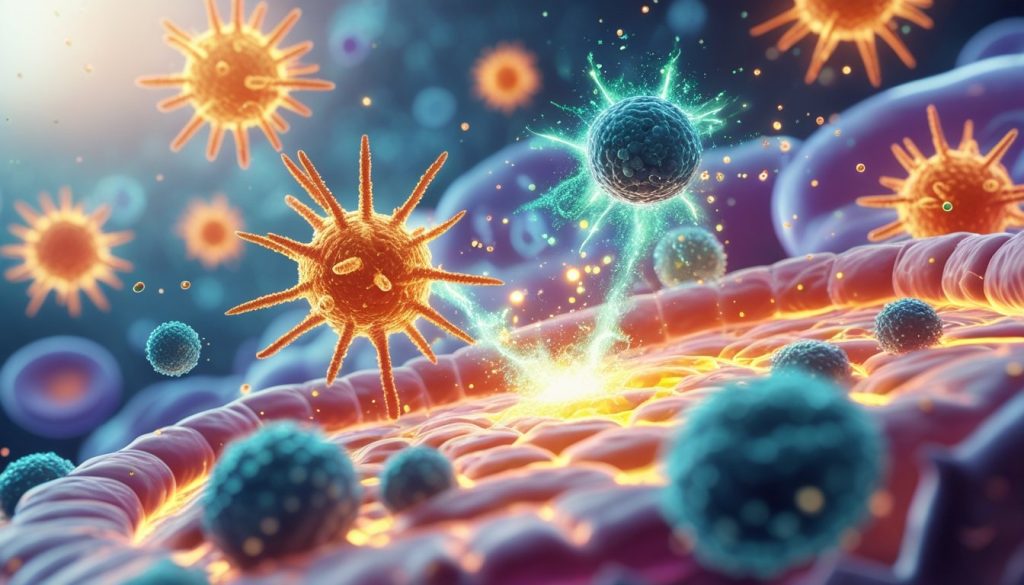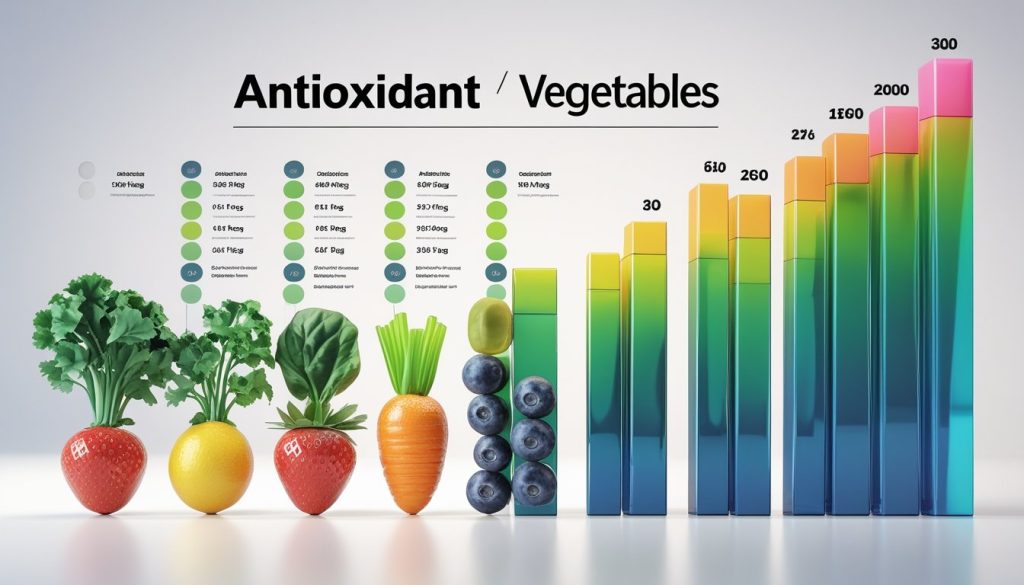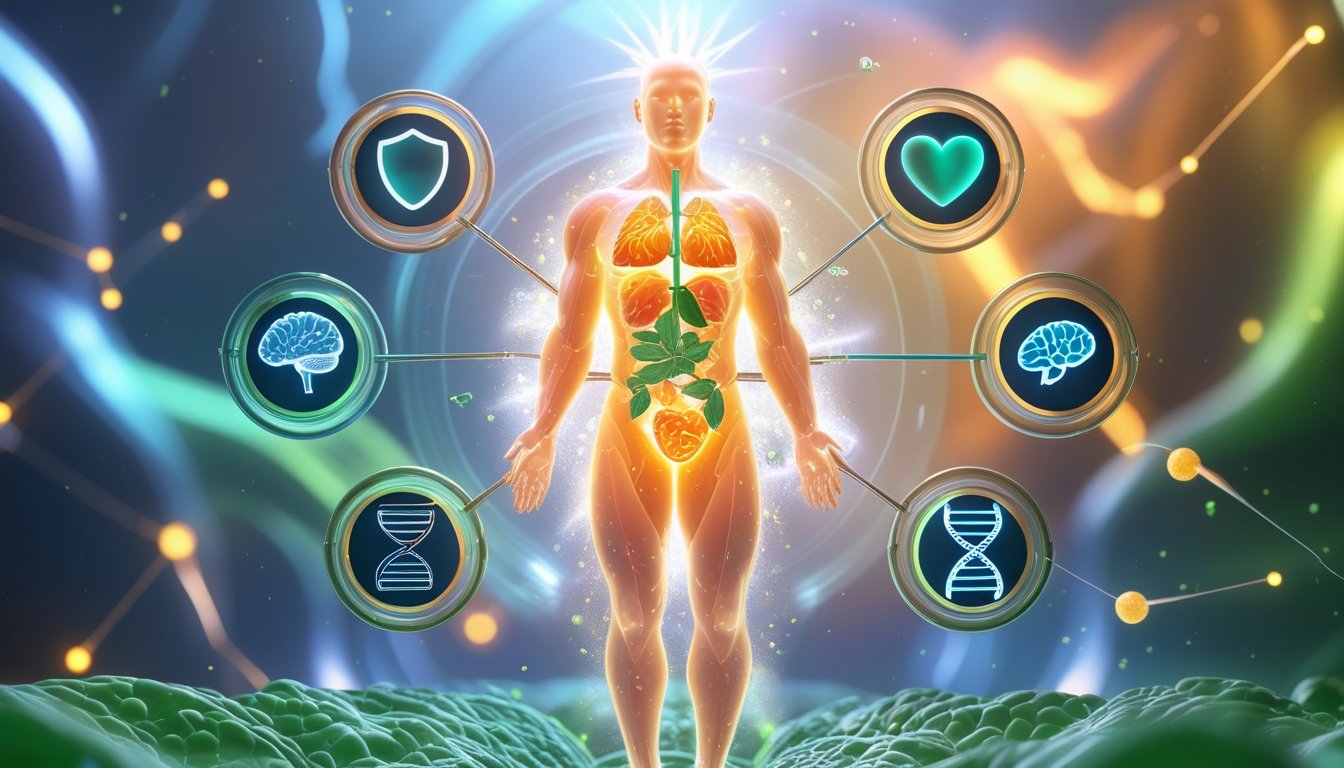Antioxidants are powerful compounds that protect your body from cellular damage caused by harmful free radicals, offering remarkable health benefits that can transform your overall wellness.
These essential molecules work tirelessly to neutralize oxidative stress, reduce inflammation, and support your body's natural defense systems against chronic diseases and premature aging23.
Free radicals are unstable molecules produced naturally during cellular metabolism and increased by external factors like pollution, UV exposure, and stress. When these molecules accumulate faster than your body can neutralize them, they create oxidative stress that damages cells, proteins, and DNA1420.
This cellular damage contributes to aging, inflammation, and various chronic diseases including heart disease, cancer, and neurodegenerative conditions.
Understanding How Antioxidants Work in Your Body
Antioxidants function by donating electrons to unstable free radicals, effectively stabilizing them and preventing the chain reactions that lead to cellular damage78. Your body produces some antioxidants naturally through enzymatic processes, while others must be obtained through diet or supplementation1113.
The antioxidant defense system includes both endogenous and exogenous components working together to maintain cellular health. Enzymatic antioxidants like superoxide dismutase, catalase, and glutathione peroxidase work alongside dietary antioxidants such as vitamins C and E, flavonoids, and carotenoids to provide comprehensive protection133.
Different antioxidants operate in various parts of your body – some work within cells while others function in the bloodstream or specific organs. For example, vitamin C works in the watery parts of cells, while vitamin E protects cell membranes from oxidative damage38.

The 7 Key Benefits of Antioxidants for Optimal Health
Powerful Disease Prevention and Immune Support
Antioxidants significantly reduce your risk of developing chronic diseases by preventing oxidative stress that contributes to cancer, diabetes, cardiovascular disease, and metabolic disorders23. Research demonstrates that people consuming antioxidant-rich diets have lower rates of these conditions, with antioxidants supporting normal cellular function and providing additional protection against disease development.
The immune-boosting properties of antioxidants help your body fight infections and maintain optimal immune function. By reducing inflammation and supporting cellular repair mechanisms, antioxidants strengthen your body's natural defense systems310.
Enhanced Brain Function and Cognitive Protection
Your brain consumes significant amounts of oxygen during daily functioning, making it particularly susceptible to free radical damage2. Antioxidants provide crucial protection against cognitive decline, memory loss, and neurodegenerative diseases like Alzheimer's and Parkinson's.
Studies show that antioxidants can delay various forms of cognitive decline and support healthy brain aging. Flavonoids found in berries and green tea specifically support brain health and reduce the risk of neurodegenerative conditions36.
Cardiovascular Health and Heart Protection
Antioxidants play a vital role in maintaining cardiovascular health by preventing cholesterol oxidation and reducing inflammation in blood vessels36. This protection helps lower your risk of heart disease, stroke, and atherosclerosis.
Research indicates that people eating more antioxidant-rich fruits and vegetables have significantly lower risks of heart disease and stroke, though the mechanisms continue to be studied1819.
Anti-Aging Benefits and Cellular Repair
Aging is associated with increased oxidative stress leading to cell damage and declining organ function. Antioxidants help counteract these effects by reducing inflammation, protecting DNA, and promoting cellular repair37.
Vitamin C and E help maintain collagen production and skin hydration, while polyphenols support brain function and cognitive health. Consistently consuming antioxidant-rich foods contributes to longer, healthier life and improved skin elasticity317.
Eye Health and Vision Protection
Specific antioxidants like lutein, zeaxanthin, and vitamins C and E provide targeted protection for your eyes23. These compounds help prevent cataracts, macular degeneration, and other age-related vision problems.
Lutein found in spinach and corn has been linked to lower incidence of eye lens degeneration and associated vision loss in elderly populations193.
Reduced Inflammation Throughout the Body
Chronic inflammation contributes to numerous health problems, and antioxidants help reduce inflammatory processes throughout your body26. This anti-inflammatory action supports joint health, cardiovascular function, and overall wellness.
Polyphenols and flavonoids found in various plant foods provide particularly potent anti-inflammatory effects, helping your body maintain optimal inflammatory balance63.
Skin Health and Protection from Environmental Damage
Antioxidants protect your skin from free radical damage caused by UV exposure, pollution, and other environmental stressors717. This protection helps prevent premature aging, maintains skin elasticity, and supports healthy skin cell turnover.
When skin cells die prematurely due to free radical damage, it accelerates skin aging. Antioxidants help prevent this cellular damage and support healthy skin appearance72.

Top Food Sources Rich in Antioxidants
Antioxidant-Packed Fruits
Berries consistently rank among the highest antioxidant foods, with blackberries, blueberries, strawberries, and raspberries providing exceptional levels of vitamin C, anthocyanins, and polyphenols159. These colorful fruits offer potent protection against oxidative stress and inflammation.
Citrus fruits like oranges and grapefruits provide high levels of vitamin C and flavonoids, while grapes contain resveratrol and other beneficial compounds1510. Stone fruits including plums and apricots also contribute significant antioxidant activity.
Nutrient-Dense Vegetables
Dark leafy greens like spinach, kale, and Swiss chard provide exceptional antioxidant content including lutein, zeaxanthin, and beta-carotene153. These vegetables support eye health, brain function, and overall cellular protection.
Colorful vegetables such as bell peppers, carrots, sweet potatoes, and tomatoes provide carotenoids and other protective compounds. Cruciferous vegetables like broccoli and Brussels sprouts contain sulforaphane and other unique antioxidants615.
Nuts, Seeds, and Healthy Fats
Nuts and seeds, particularly almonds, walnuts, and sunflower seeds, provide vitamin E and other fat-soluble antioxidants310. These foods support cell membrane protection and provide essential fatty acids for optimal health.
High-quality vegetable oils, especially extra virgin olive oil, contain powerful antioxidants like oleocanthal that provide both antioxidant and anti-inflammatory benefits810.
Beverages and Other Sources
Green tea contains catechins and other polyphenols that provide potent antioxidant protection610. Coffee also contributes significant antioxidant activity when consumed as part of a balanced diet.
Dark chocolate with high cocoa content provides flavonoids that support cardiovascular and brain health310. Herbs and spices like turmeric, oregano, and cinnamon also contribute meaningful antioxidant activity.

Maximizing Antioxidant Benefits Through Smart Nutrition
Optimal Absorption and Synergy
Antioxidants work most effectively when consumed together rather than in isolation8. Whole foods provide complex combinations of antioxidants that work synergistically to provide greater protection than individual compounds.
Including healthy fats in your diet improves absorption of fat-soluble antioxidants like vitamins A and E7. Combining different colored fruits and vegetables ensures you receive a wide spectrum of protective compounds.
Timing and Preparation Methods
Fresh, minimally processed foods typically provide the highest antioxidant content. However, some cooking methods can actually increase antioxidant availability – for example, cooking tomatoes increases lycopene absorption19.
Eating antioxidant-rich foods throughout the day provides consistent protection against oxidative stress. Including these foods with meals that contain healthy fats optimizes absorption of fat-soluble antioxidants.
Understanding Antioxidant Supplements vs. Whole Foods
While antioxidant supplements are widely available, research consistently shows that whole foods provide superior benefits compared to isolated compounds818. Studies indicate that foods reduce oxidative damage more effectively than supplements, likely due to the complex interactions between various compounds in whole foods.
High-dose antioxidant supplements may actually be harmful in some cases, with some studies showing increased mortality risk with excessive supplementation8. The “antioxidant paradox” demonstrates that more is not always better when it comes to isolated antioxidant compounds.
For most people, focusing on a varied diet rich in antioxidant-containing whole foods provides optimal benefits without the risks associated with high-dose supplementation818.

Incorporating Antioxidants into Your Daily Routine
Practical Meal Planning Strategies
Start each day with antioxidant-rich foods like berries in your breakfast or green tea instead of coffee. Include colorful vegetables in every meal, aiming for a variety of colors to ensure diverse antioxidant intake.
Snack on nuts, seeds, or fresh fruits between meals to maintain consistent antioxidant levels throughout the day. Replace processed snacks with whole food options that provide natural antioxidant protection.
Simple Lifestyle Changes
Choose organic produce when possible to minimize exposure to pesticides while maximizing antioxidant content. Store fruits and vegetables properly to maintain their antioxidant potency over time.
Consider adding antioxidant-rich herbs and spices to your cooking for both flavor enhancement and additional health benefits. Even small amounts of these concentrated sources can contribute meaningful antioxidant activity.
Frequently Asked Questions About Antioxidants
What are antioxidants and why do I need them?
Antioxidants are molecules that protect your cells from damage caused by free radicals, unstable compounds that can lead to inflammation, aging, and chronic diseases. Your body needs antioxidants to maintain cellular health and prevent oxidative stress.
Which foods contain the highest levels of antioxidants?
Berries, dark leafy greens, colorful vegetables, nuts, seeds, and green tea are among the richest sources of antioxidants. Focusing on a variety of colorful plant foods ensures optimal antioxidant intake.
Can I get enough antioxidants from food alone?
Yes, a balanced diet rich in fruits, vegetables, nuts, and whole grains typically provides adequate antioxidant levels for most people. Whole foods offer superior benefits compared to supplements.
Are antioxidant supplements necessary?
For most healthy individuals eating a varied diet, antioxidant supplements are not necessary and may even be harmful in high doses. Focus on whole food sources for optimal benefits.
How do antioxidants help prevent aging?
Antioxidants protect against cellular damage that contributes to aging by neutralizing free radicals, reducing inflammation, and supporting DNA repair mechanisms.
What's the difference between water-soluble and fat-soluble antioxidants?
Water-soluble antioxidants like vitamin C work in cellular fluids, while fat-soluble antioxidants like vitamin E protect cell membranes. Both types are important for comprehensive protection.
Can antioxidants help with exercise recovery?
Antioxidants can help reduce exercise-induced oxidative stress and inflammation, potentially supporting recovery. However, some oxidative stress from exercise is beneficial for adaptation.
How much antioxidant-rich food should I eat daily?
Aim for at least 5-9 servings of fruits and vegetables daily, along with nuts, seeds, and other antioxidant-rich foods as part of a balanced diet.
Do cooking methods affect antioxidant content?
Some cooking methods can reduce antioxidant content, while others may increase availability. Light cooking methods like steaming often preserve antioxidants better than boiling.
Can antioxidants interact with medications?
Some antioxidants, particularly in supplement form, can interact with certain medications. Consult your healthcare provider if you're taking medications and considering antioxidant supplements.
Ready to explore more about optimizing your nutrition? Discover how amino acids work synergistically with antioxidants to support your health goals by visiting our comprehensive guide on amino acids and their powerful benefits.

